Pit Bull Colors
June 4, 2021 2021-08-15 17:41
Pitbulls are one of the most popular breeds in the US and beyond. Their loyalty and devotion to their owner as well as their powerful and athletic body make them perfect companions.
While Pitbulls are best known in black, red and brindle, there actually are over 20 different colors and patterns for these cool dogs. Let’s look at the different Pitbull colors, as well as how rare those are!
Table of Contents

23 Different Pit Bull Colors

#1 Black Pit Bull
A solid black coat on a muscular American Staffordshire or American Pit Bull Terrier can be an intimidating sight. Often associated with blood-thirsty sports like bear baiting and dogfighting, the black Pit Bull has developed an unfair reputation as an aggressive dog that can lock its jaws, delivering a terrifying 1,600 lbs of force.
None of this is true, and studies have shown that Pit Bulls don’t “have any mechanical or morphological differences in jaw structure when compared to other dogs.” Furthermore, even the ferocious-looking black Pit Bull has the same bite pressure as any other breed – around 320 lbs.
Despite their appearance, black pit bulls make wonderful companion dogs, assuming they receive proper training and socialization, and adapt well to family life, showing surprising patience with young children.
The black Pittie nevertheless suffers the same black dog syndrome as any other breed, making it more likely that you’ll find one in a shelter or rescue center. They’re not guardians of the underworld, as many believe, but loving canines in desperate need of a caring home.
Once in their home, owners should take care to ensure good visibility – these dogs require light-up collars to be seen on nighttime walks.
#2 Red Pit Bull
The red pit bull is a rich chestnut color and often has a red nose and amber eyes. The red nose Pit Bull is one of the oldest American Staffordshire Terrier bloodlines, stretching back to the 1800s when a strain known as the Old Family Dogs emerged in Ireland.
As this bloodline carried the recessive gene responsible for the red coat, the strain subsequently became known as the Irish Old Family Reds. These dogs traveled to the US with Irish immigrants and became sought after for their “gameness” or ability “to develop traits of eagerness despite the threat of substantive injury.”
The Old Family Reds were crossed with various other strains of American Staffordshire and American Pit Bull, which means almost any parentage could produce the occasional red-nosed pup.
Not only do these dogs have a distinct brown, copper, or red hue to their coats, but they also tend to be slightly larger and more muscular than your standard American Staffy.
This color is prominent in the popular Razor Edge Pitbull.
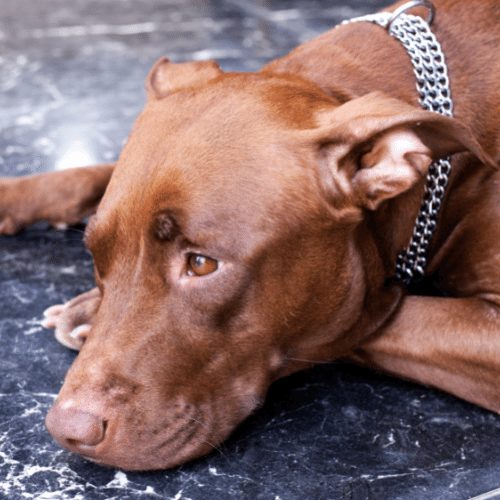
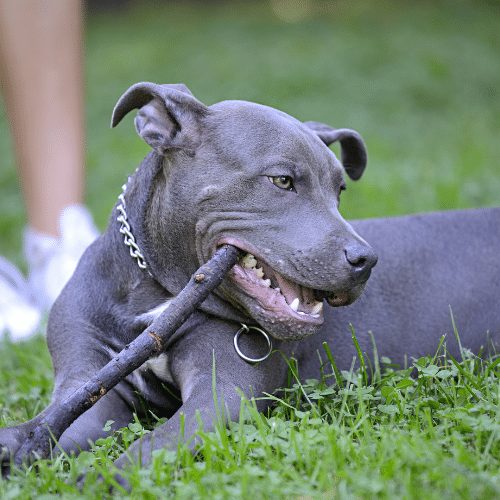
#3 Blue Pit Bull
With its silver-grey to charcoal-hued coat, the blue Pit Bull has a striking appearance even though it’s not one the AKC approves of. The rare color is produced by a recessive gene that dilutes black to create a range of silver-blue to deep gray colors.
This recessive gene concentrates the pigmentation in the dog’s coat around the center of the follicle, while the tips of the hairs remain almost colorless. This combination produces a kind of optical illusion that makes the dog appear blue.
As blue and blue-nosed Pit Bulls are the result of a recessive gene, they are difficult to breed, making them one of the rarer shades of Pit Bull. They are also controversial as those breeding these rare dogs have only a small gene pool available to them. The subsequent inbreeding can increase the likelihood of certain health issues, including alopecia, deafness, and immune and nervous system dysfunction.
#4 Tan Pit Bull
Although not particularly common, the tan color is accepted in all breeds of Pit Bull and is the result of Phaeomelanin, which produces a reddish pigmentation. Many tan pit bulls also have white markings and points, but some have solid-colored coats that many owners refer to as beige or brown.
The only time a tan-colored Pit Bull becomes problematic is when the tan is combined with another color, most commonly black. This coloration is such as serious fault it will lead to disqualification from the AKC show ring. A tan Pit Bull, on the other hand, is recognized by both the AKC and the UKC, while the Fédération Cynologique Internationale (FCI) only lists the following as acceptable colors: “red, fawn, white, black or blue.”
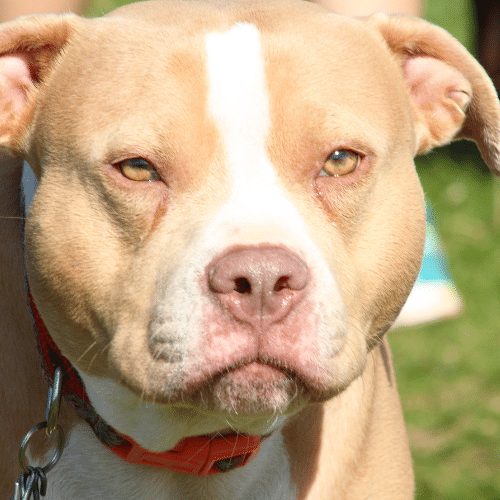

#5 Fawn Pit Bull
The dilute coat color of the fawn Pit Bull is the result of a dilution of the allele of the Agouti (A) locus that also produces tan, red, and buckskin Pit Bulls. A relatively common color in all breeds of Pit Bull, fawn dogs vary in color from a darker beige, almost brown color, through to a very pale hue almost the color of champagne. Many have white markings on their fawn coats, and those without any white points are surprisingly rare.
Fawn is known as lilac in some other breeds – such as in Border Collies, where this is also a very rare color.
The breed most well-known for this coloring is the Weimaraner.
#6 Fawn Sable
This eye-catching color combination is a rare variant of the solid fawn Pit Bull. In addition to the base fawn coat, these dogs sport a black overlay on their backs that may extend into a black mask over their muzzles.
Not listed in the AKC’s breed standard for the Staffordshire Bull Terrier, the fawn sable color pattern is nevertheless acceptable in the American Staffordshire breed standard, which states, “Any color, solid, parti, or patched is permissible.”
#7 Seal
This uncommon color can often appear black at first sight but, once viewed in sunlight, shows a red or brown cast. Sometimes called seal brown, it’s believed this color is basically “a black that has incomplete dominance.”
According to Dr. Phillip Sponenberg, a professor of pathology and genetics at Virginia-Maryland Regional College of Veterinary Medicine, in other species, the black color that occurs at the extension locus can be “weak and leaky,” producing off-black shades like those seen in seal brown Pit Bulls.
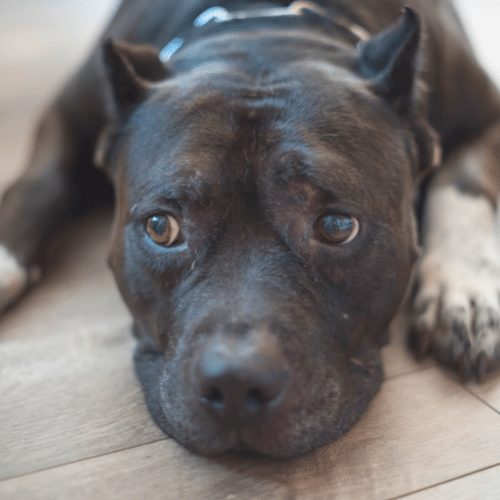

#8 Buckskin
Buckskin is one of the most common colors found in American Pit Bulls, perhaps due to the popularity of the Jeep bloodline. This bloodline originated from a black-nosed buckskin called Crenshaw’s Jeep, who was bred by James Crenshaw in 1976. Before his death in 1989, Jeep sired a huge number of puppies, including numerous showing champions.
Some buckskin Pit Bulls also have red noses, suggesting some interbreeding between the Jeep and Old Family Red bloodlines.
#9 Blue Fawn
These silver-colored dogs are highly sought after and often have the Old Family Red nose which makes them even more eye-catching. It also makes it easier to distinguish them from the blue-nosed Pit Bull.
The distinctive appearance of blue fawn Pit Bulls comes from a homozygous recessive gene, making it one of the rarer Pit Bull colors. For the blue fawn color to occur, a puppy must inherit the dilute gene from both parents. This will cause the black pigmentation to fade, creating the striking blue/grey color of the blue fawn.


#10 Black Brindle
Although some Staffordshire Bull Terriers may appear completely black, most are secretly black brindle with streaks of color creating an almost tiger-striped pattern throughout their coats. This patterning only occurs in certain breeds of dogs but is present in all four varieties of Pit Bull.
The brindle coloration is almost as old as the Pit Bull breeds, and over the years, a couple of black brindle Pit Bulls have made history. Sergeant Stubby was a black brindle Pit Bull crossbreed who became the unofficial mascot and hero of the 102nd Infantry Regiment during the Second World War.
Another famous brindle Pit Bull went by the name of Bud and roared his way into the history books by completing the first-ever journey across the US in an automobile. Bud didn’t drive, but he did get his own pair of goggles to protect his sensitive eyes from the dust and debris.
#11 Red Brindle
While there may not be as many famous red brindles as there are black brindles, there are some famous owners, including Jessica Biel, who is often seen out and about with her red brindle Pittie called Tina.
Pit Bulls with the red brindle pattern have a light-colored base coat caused by the dilution of pheomelanin, overlaid with deep red tiger stripes. The result is both attractive and, according to most kennel clubs, permissible, whether it occurs in the American Bully or the Staffordshire Bull Terrier.

#12 Blue Brindle
Another brindle variation, the blue brindle Pit Bull has a similarly light-colored base coat to the red brindle, but the stripes can vary widely in color from pale blue to charcoal grey.
This distinctive coloration is relatively rare as it requires a complex genetic recipe to create it. Only by combining the predominant black gene (B) with the brindle gene (Kbr) and the dilute gene (d) will you get this striped appearance.
#13 Blue Fawn Brindle
Much like the solid-colored blue fawn Pit Bulls, these brindle-patterned dogs have a silver-colored base coat, overlaid with dark or fawn stripes. A complex combination of colors creates this unique look, making it one of the less common Pit Bull colors.
#14 Fawn Brindle
More common than the blue fawn brindle and yet just as eye-catching, the fawn brindle is one of the brightest color combinations you’ll see on a Pit Bull. With black stripes on a fawn background, these dogs look almost tiger-like.

#15 Reverse Brindle
In a dog with a reverse brindle coloration, the darker color is dominant, with the lighter color forming the stripes, swirls, and patterns. The darkest reverse brindle dogs appear almost black, with the occasional streak of muted color.
A reverse brindle Pittie with soft blue or gray markings will often have a blue nose to go with it, whereas those with red or brown stripes may have a matching red nose.
#16 Tricolour
Tricolor Pit Bulls of all varieties have become increasingly popular in recent years, leading to more breeders trying to perfect the pattern. Instead of the usual two-color combination, Tricolor Pit Bulls have three different and well-defined colors, usually consisting of white, tan, and one base color.
The tricolor Pit Bull has yet to be recognized by any of the kennel clubs, perhaps because it is relatively new. The recessive tan point allele (at) is responsible for this unusual pattern but must be present in both the sire and the dam for a tricolor puppy to be born.
In the American Bully, a dog is only considered to be a true tricolor if tan points are visible in “at least one of the 13 traditional locations”.
Some breeders have crossed Doberman with Pitbulls to get taller offspring with consistent tan point coloring.
#17 White
An all-white American Staffordshire Terrier isn’t something the AKC encourages, even though it finds the white Staffordshire Terrier perfectly acceptable. The white Pit Bull is as popular as it is controversial. Sometimes they are confused or even crossed with Dogo Argentinos as well.
Unlike a Pit Bull with either albinism or leucism, a pure white Pit Bull will have pigmentation in its nose, paws, and around the eyes. The nose may be black, red, or blue, but it certainly won’t be pink. It will also be a healthy animal that’s free of the issues associated with either genetic mutation although white Pit Bulls, and particularly those with red noses, do tend to be more sensitive to direct sunlight.
It’s always easy to tell the difference between a white Pit Bull and one suffering from either albinism or leucism, however, and even experts make mistakes from time to time.
While an albino Pit Bull will usually have very pale blue eyes and pink features, a Leucistic one is harder to distinguish. Leucism refers to the partial loss of pigmentation so these dogs can look very similar to pure white Pit Bulls. Unfortunately, they won’t be as healthy as both albino and Leucistic Pit Bulls tend to suffer from poor eyesight and other issues relating to the lack of pigmentation in the iris.

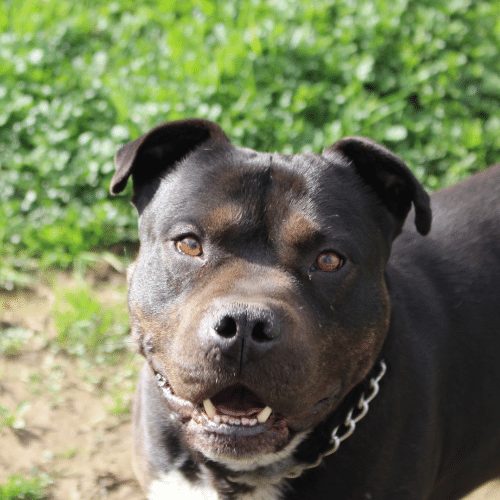
#18 Liver
Liver is one of those tricky colors that falls somewhere between grey and brown. Although there is a registration code for liver Staffordshire Terriers listed on the AKC site, the full breed standard states that dogs of this color should be disqualified.
Also referred to as chocolate, this grayish-brown coloration is caused by the dilution of eumelanin or the black pigment.
#19 Brown And Tan
Heavily frowned upon by most kennel clubs, the brown and tan color combination is more commonly seen in German Shepherd dogs and Rottweilers. As with the tricolor, this color combination is produced when a puppy inherits two copies of the tan-point gene.
There seems to be some confusion about whether this color is acceptable for the Pit Bull breeds with some claiming “the AKC also accepts the black and tan as an acceptable color pattern for the American Staffordshire Terrier,” when the breed standard clearly states that black-and-tan dogs should be disqualified.
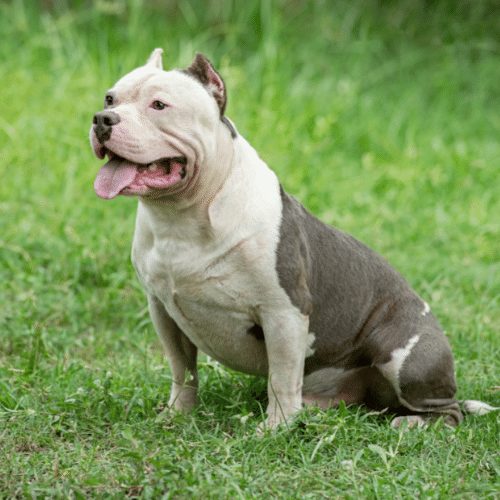
#20 Blue And White
Although the black and tan combination isn’t considered correct for the Pit Bull breeds, other color combinations are both acceptable and attractive. This mixture of a blue base coat with white patches looks particularly dignified and isn’t altogether uncommon.
#21 Black and White
These two-colored Pit Bulls most commonly have a predominantly black coat, with white markings on the chest and paws. The black and white coloration occurs more frequently in the American Bully and American Staffordshire Terrier than in the other types of Pit Bull but is recognized as part of the breed standard across the board.
Black and white, or even brown and white Pit Bulls, are sometimes referred to as Moo Moo Pit Bulls because they bear such a close resemblance to the traditional Freisian dairy cow.


#22 Merle
The rarest of Pit Bulls comes wrapped in a coat of mottled colors and splotches. While that may not sound particularly attractive, the merle Pit Bull can be breath-taking in its appearance, displaying a wide range of colors and patterns.
Despite being an attractive look on a Pittie, merle is considered a fault by most kennel clubs, and some experts, like the author Diane Jessup, even go as far as to say, “in almost all cases the color can be traced back to crossbreeding with Catahoula leopard dogs.”
Others claim that the merle color was evident early on in the breeding of American Pit Bulls and a pregnant merle, known as Goldie, appeared in a photograph dated 1922 that was published in Colby’s Book Of The American Pit Bull Terrier.
The strange patterning is produced by the dominant merle allele in the M locus which dilutes the solid black color of the coat, creating patches of a lighter hue, like gray or white.
#23 Spotted
In addition to the wide variety of colors, Pit Bulls can also come with a range of spots, splashes, and interesting patterns, which almost makes you want to start collecting them! A spotted Pit Bull looks a little like a short, stocky version of the Dalmatian and can come with any variation of patterns, from solid patches to subtle flecks throughout the coat.The 4 Types of Pitbulls
Pit Bull is a blanket term applied to four different breeds of dog, which could explain why there is so much variation in its appearance. The four types of Pit Bull are:
American Pit Bull Terrier
The oldest recognized breed of Pit Bull, the American Pit Bull Terrier, originated in the UK, arriving in the US shortly before the Civil War in 1861. Although initially bred for fighting, the American Pit Bull Terrier evolved in all-purpose dogs, capable of herding cattle, guarding livestock, and even looking after young children.
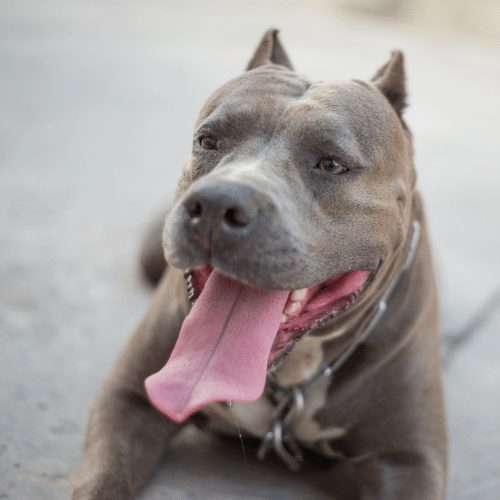
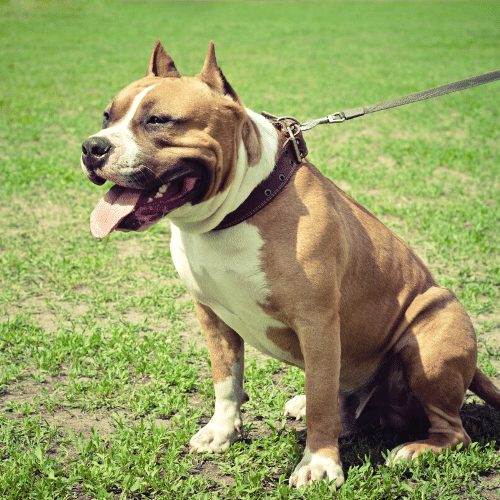
American Staffordshire Terrier
Descended from the English Bulldog, the American Staffordshire Terrier, also known as the AmStaff, is larger than the Staffordshire Bull Terrier, standing around 17 to 19 inches high and weighing between 40 and 70 lb. The American Staffordshire Terrier was recognized as a subset of the Pit Bull breed in 1936 to distinguish them from the American Pit Bull that was still used primarily for fighting.
Staffordshire Bull Terrier
Unsurprisingly, the Staffordshire Bull Terrier originates from Staffordshire in the UK. A cross between a bulldog and a terrier, this breed was developed by James Hinks who “wanted to develop a socially acceptable “gentleman’s companion” that lack the aggressive tendencies of the bull terriers bred for the fighting pit.

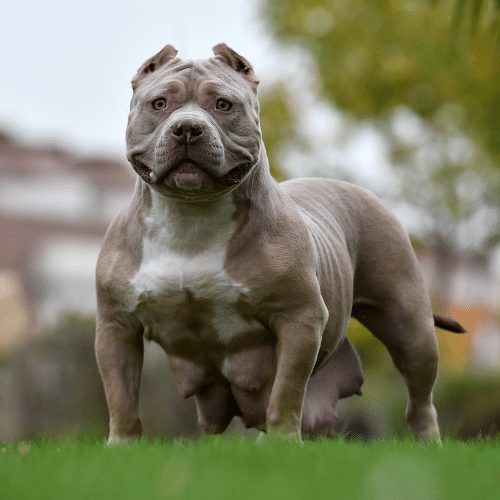
American Bully
The newest of all the Pit Bull breeds, the American Bully was only recognized by the UKC in 2013, and that remains the only kennel club to list the breed. The American Bully is a powerful, muscular dog with a contrarily gentle demeanor.
What is the rarest Pit Bull color?
With its unusual genetics and controversial history, Merle is the rarest Pit Bull color and one that most kennel clubs reject outright. The lack of official recognition seems to come, at least in part, from the health issues associated with this rare coloration. Studies suggest that Merle Pitties “are more likely to develop reduced vision and hearing,” but that doesn’t stop people from breeding them. Mind you, a top-of-the-range Merle Pit Bull can fetch three times as much as a black or brindle one, so it’s not surprising.
Remember that you should never get a dog solely based on his rare color or pattern. Pitbulls live up to 15 years and need to be exercised, trained, cared for and loved every day! Don’t acquire a dog just because he looks fancy.
What is the most expensive Pit Bull color?
As we mentioned above, the cost of a Merle Pit Bull far surpasses the price of almost any other color and, while a Red Pit Bull Puppy may cost you $2,000, a merle pup could set you back as much as $15,000 or $30,000! Even then, there’s no guarantee it won’t have inherited some health issues along the way.
What two colors make a tricolor Pit Bull?
The most common colors found in the tricolor Pit Bull are white, black, and brown, but any combination is acceptable.
Are Pit Bulls legal in the US?
All breeds of Pit Bull have suffered at the hands of the Breed Specific Legislation (BSL) enforced by certain states. Labeling these breeds as aggressive, these laws have prohibited residents from owning a Pit Bull while others require owners to conform to strict requirements, like keeping their dogs muzzled in public. Those states with the most restrictive BSL include Arkansas, Iowa, Kansas, Kentucky, Louisiana, Michigan, Mississippi, Missouri, Ohio, and Wisconsin.
Can I adopt A Pit Bull in the US?
Pit Bulls have gained a bad reputation over recent years, despite being once celebrated as an American icon, and that, combined with other factors, has caused an overpopulation of all types of Pit Bull. According to the Progressive Animal Welfare Society (PAWS), “Pit Bulls and mixes of the breed often account for 20 percent or more of the dogs available for adoption at area shelters.”

Author: Nicky Hoseck
Nicky lives on a small-holding on South Africa’s Wild Coast with a selection of animals, a husband, and five dogs. She spends all her waking hours with her Australian Cattle Dog, Koala, either walking, horse-riding, running, or just hanging out.
Originally from the UK, Nicky been living with dogs for over 40 years and is a passionate dog-owner.
With a Masters Degree from the University of London under her belt, Nicky has had a diverse career, training and riding horses, running safari lodges, and hosting volunteers. She’s now a full-time writer.

